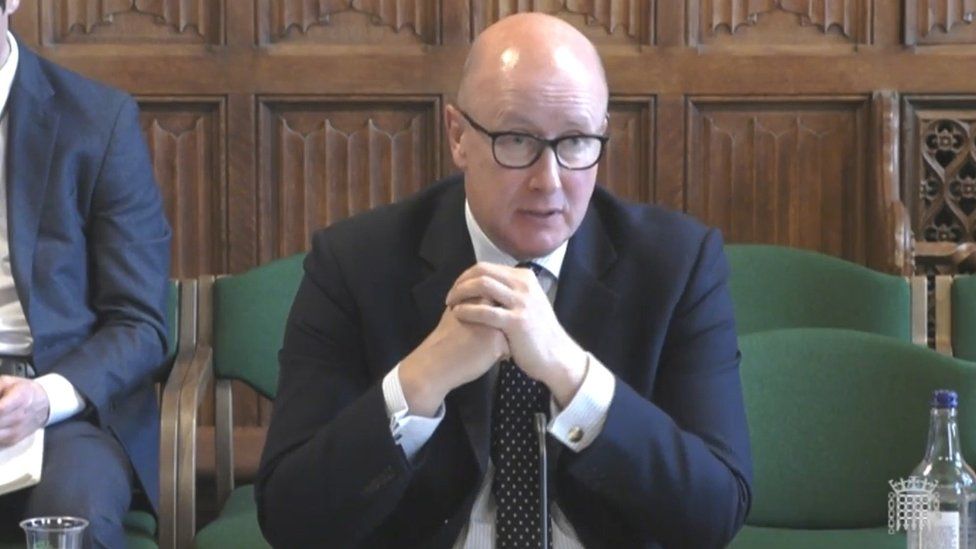ARTICLE AD BOX
By Chris Mason
Political editor, BBC News
 Image source, House of Commons
Image source, House of Commons
Lord Geidt did not look like a man in love with his job as he addressed MPs on Tuesday
His demeanour and delivery screamed exasperation, even if his words were carefully chosen. When Lord Geidt appeared before a parliamentary committee on Tuesday, for the best part of two hours, he didn't look like a man in love with his job.
Just over 24 hours later, in a written statement of few words and even less detail, came confirmation that he really didn't.
He was resigning, the second such ethics adviser to the prime minister to walk in the last eighteen months. It appears he had concluded his position was untenable, enough was enough.
It also appears there are more details he is privy to about what has been going on than are currently known about more widely.
So what do we know about what happened in the last few days?
I'm told that on Monday, Lord Geidt met the prime minister and offered to serve in the job for another six months.
He was also asked by Boris Johnson to advise on a commercial decision the government is contemplating - and whether this would breach any existing commitments and so not be in line with the ministerial code.
We don't know the details of this yet, nor if this request contributed to his resignation, but the specific timing of his departure has left No10 baffled, given his commitment to stay.
On Wednesday evening, Lord Geidt phoned the prime minister's principal private secretary to tell him he was resigning. Mr Johnson was informed of the decision at about 18:30 BST, shortly after finishing a phone call with Ukraine's President Volodymyr Zelensky.
But while the particular timing has surprised some in Downing Street, Lord Geidt's discomfort in the job has been evident for a while.
Just last month he had said in a report that it was a legitimate question to ask if Boris Johnson had breached the ministerial code by breaking Covid laws.
But, as Lord Geidt put it, the code's "author and guardian" is Mr Johnson. The prime minister hadn't sought an investigation from Lord Geidt into whether he had, and was of the view that he hadn't.
As Lord Geidt put it: "I have attempted to avoid the independent adviser offering advice to a prime minister about a prime minister's obligations under his own ministerial code.
"If a prime minister's judgement is that there is nothing to investigate or no case to answer, he would be bound to reject any such advice, thus forcing the resignation of the independent adviser. Such a circular process could only risk placing the ministerial code in a place of ridicule."
Lord Geidt also spelled out in the report that he didn't like the terms of his job - "the prevailing arrangements still remained insufficiently independent to be able to command the confidence of the public" as he put it.
No 10 would point out some of those arrangements have since changed. But it is also true that so too had new guidelines meaning ministers wouldn't get sacked for "minor" breaches of the ministerial code.
Image source, Reuters
Image caption,No 10 was baffled by the resignation of the PM's ethics adviser - for the second time in 18 months
The truth is we don't yet know definitively why Lord Geidt resigned, as his resignation letter has not been published - which itself is unconventional.
The prime minister is expected to write back to Lord Geidt on Thursday morning, and that reply may well be made public.
What we do know is it wasn't just Partygate that caused headaches: a row about the renovation of the prime minister's flat led Lord Geidt to rebuke Boris Johnson for showing "insufficient" respect for his role.
And remember, too, Lord Geidt's predecessor resigned as well. Sir Alex Allan walked out in November 2020 after concluding the Home Secretary Priti Patel had breached the ministerial code, which conventionally results in a resignation or sacking. And yet Ms Patel didn't leave and the prime minister didn't sack her.
So twice in a year-and-a-half, the person appointed to oversee ethics and conduct in Mr Johnson's government has given up.
Just as Mr Johnson had managed to shift the political conversation away from his behaviour and on to policy, a swirl of headlines about this appears.
And along with the headlines, comes a vacancy in government. I walked down Whitehall earlier on; I can't say I spotted a queue of people lining up to take the job on.

 2 years ago
25
2 years ago
25








 English (US) ·
English (US) ·